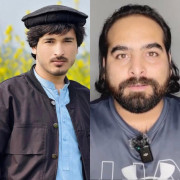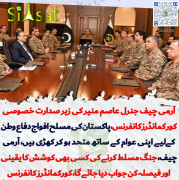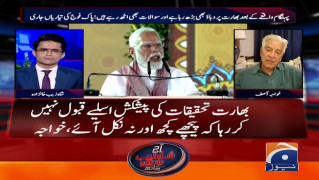M Ali Khan
Minister (2k+ posts)
Taliban in city gaining strength in numbers
Salis bin Perwaiz
Saturday, November 03, 2012
From Print Edition
http://www.thenews.com.pk/Todays-News-4-140693-Taliban-in-city-gaining-strength-in-numbers

Karachi
A disclosure that will give the shudders to the citizens of Karachi has come to the fore that the Taliban are not only holding sway in various parts of the city, but are also shrewdly boosting their numbers by wooing the families of target killing victims.
Cunningly, the activists of the Tehreek-e-Taliban Pakistan are approaching the lower strata of society for their recruitment campaign – mostly families of murdered labourers – and inciting them to seek revenge, intelligence sources have revealed.
Besides, the TTP is also indulged in relief activities in the areas where they have established themselves, paying cash to the needy or fulfilling their other requirements.
Areas under their grip
According to a survey, the areas where the Taliban have firmed their grip include Sohrab Goth, Quaidabad, Shireen Jinnah Colony, New Karachi Industrial Area, Sultanabad, Manghopir, Baldia Town (particularly Saeedabad), Surjani Town, Qasba Colony, Peerabad, Shah Latif Town and Shah Faisal Colony.
“The TTP is present in almost all areas on the outskirts of the city and has hoisted its flags there,” the sources disclosed.
“After a comprehensive operation against the banned outfit in Swat and Waziristan, its leaders and activists fled to Karachi and settled on its outskirts. Most of the areas where the Taliban are now present were earlier strongholds of the Awami National Party.”
They added that to penetrate into these areas, the Taliban first targeted the ANP’s offices and also sent threatening letters to the party’s leadership in Karachi.
“The TTP took over the ANP’s offices in some of these areas, removing the party’s flags and hoisting its own. After a few months, they chalked out a strategy to kill ANP leaders and activists.” However, the ANP denies these reports.
The TTP is extorting members of the Waziri and Mehsud tribes living in these areas.
Their objectives
The Taliban have resurfaced in the city with new objectives this time, a primary one among them is to kill law enforcement agencies’ personnel and members of other religious sects.
They are also generating funds for their organisation by robbing banks and extorting traders.
“In collaboration with another banned outfit, the Lashker-e-Jhangvi, the Taliban are targeting policemen and members of the Shia and Bohri communities,” the sources said.
“The TTP recruits people from Karachi and robs banks and foreign exchange companies to generate funds for terrorist activities. These tasks are assigned to them by the central ring leaders in Waziristan.”
The first time the law enforcement agencies discovered the TTP’s presence in Karachi was in 2005. The discovery had confirmed suspicions that the banned outfit was regrouping in the country’s major cities and planning to carry out attacks there.
Extorting traders
A senior police officer on the condition of anonymity told The News that the banned outfit was inflicting heavy losses on the country’s economy by harassing the city’s business community.
“The TTP and LJ were earlier kidnapping traders for ransom. But now they have changed their tactics and find extorting traders a much hassle-free option. They have also started extorting multinational companies and food chains.” The Crime Investigation Department had recently arrested several TTP activists who were extorting traders.
Their targets
The police officer said the TTP and the LJ Ataur Rehman Group had also started killing members of other sects, mostly those belonging to the Shia and Bohri communities. Later, he added, policemen and the personnel of other law enforcement agencies also became their target when crackdowns were launched against them. “They want to create an atmosphere of fear and panic in the city.”
The officer said ANP leaders and activists were also on the Taliban’s hit-list, as the banned outfit was taking over the areas dominated by the party.
The TTP had recently killed three ANP activists in Sherpao Colony, Quaidabad.
On August 28 this year, 36-year-old Amanullah, the ANP’s ward president in the MPR Colony, was shot dead in Orangi Town. Earlier on August 13, the party’s Sindh Central Working Committee member, 55-year-old Amir Sardar, was murdered near his house along with two other activists in Frontier Colony. Sardar, who was associated with the ANP for over 30 years, hailed from the Thana area of the Khyber Pakhtunkhwa’s Malakand district.
However, the sources said not all murders of ANP activists could be attributed to the TTP.
Operation planned
At a meeting held in the city recently, President Asif Ali Zardari had expressed his concern over the deteriorating law and order situation and terrorist activities in the metropolis and ordered the law enforcement agencies to tackle the issue by taking concrete measures.
The sources said the present Sindh Rangers director general, who with his earlier success in Waziristan particularly against the TTP, was chosen for this task. They added that in the coming days, the Sindh Rangers, in collaboration with police, would start a comprehensive operation against the TTP and the LJ.
Killing of cops
More than 100 policemen have been murdered in the city this year. Investigators told The News that though the TTP was involved in a few of them, the banned outfit still posed a major threat to the law enforcers.
According to the figures compiled by the Sindh police department till October 20, 96 policemen were killed in the city including SPs, DSPs, inspectors, sub-inspectors, assistant sub-inspectors, head constables and constables. Twenty policemen including an SP were murdered in District East, 11 in District Malir, 21 in District South, 31 in District West and 13 in District Central.
The sources said usually there were about two or three constables patrolling in a police van. “They have no knowledge about the areas where the Taliban are present and are vulnerable to being ambushed.”
SSP Khurram Waris told The News that the rise in the attacks on policemen could be attributed to the increase in the action against banned outfits.
“The criminals target the policemen to scare them into backing out of their duties, but the law enforcers will continuously work to root them out.”
The SSP said police were the only hurdle for the TTP in areas where it was present including Gulshan-e-Maymar, FB Industrial Area, Peerabad, Manghopir, Sultanabad and Baldia Town. “That is why the militant outfit is targeting police vans and check-posts. The police must remain alert at all times and perform their duties with responsibility. Policemen need to take preemptive measures when travelling alone.”
The police official noted that his force’s biggest achievement was the killing of a TTP commander, Umer Khattab, in Manghopir. Khattab was wanted in many target killing cases, mostly those of police officials.
To a query, the SSP admitted that there were some black sheep in his department in the past that tipped off criminals about raids. “However, there are no longer such cases. However, we are still reviewing the past records of policemen.”
Salis bin Perwaiz
Saturday, November 03, 2012
From Print Edition
http://www.thenews.com.pk/Todays-News-4-140693-Taliban-in-city-gaining-strength-in-numbers

Karachi
A disclosure that will give the shudders to the citizens of Karachi has come to the fore that the Taliban are not only holding sway in various parts of the city, but are also shrewdly boosting their numbers by wooing the families of target killing victims.
Cunningly, the activists of the Tehreek-e-Taliban Pakistan are approaching the lower strata of society for their recruitment campaign – mostly families of murdered labourers – and inciting them to seek revenge, intelligence sources have revealed.
Besides, the TTP is also indulged in relief activities in the areas where they have established themselves, paying cash to the needy or fulfilling their other requirements.
Areas under their grip
According to a survey, the areas where the Taliban have firmed their grip include Sohrab Goth, Quaidabad, Shireen Jinnah Colony, New Karachi Industrial Area, Sultanabad, Manghopir, Baldia Town (particularly Saeedabad), Surjani Town, Qasba Colony, Peerabad, Shah Latif Town and Shah Faisal Colony.
“The TTP is present in almost all areas on the outskirts of the city and has hoisted its flags there,” the sources disclosed.
“After a comprehensive operation against the banned outfit in Swat and Waziristan, its leaders and activists fled to Karachi and settled on its outskirts. Most of the areas where the Taliban are now present were earlier strongholds of the Awami National Party.”
They added that to penetrate into these areas, the Taliban first targeted the ANP’s offices and also sent threatening letters to the party’s leadership in Karachi.
“The TTP took over the ANP’s offices in some of these areas, removing the party’s flags and hoisting its own. After a few months, they chalked out a strategy to kill ANP leaders and activists.” However, the ANP denies these reports.
The TTP is extorting members of the Waziri and Mehsud tribes living in these areas.
Their objectives
The Taliban have resurfaced in the city with new objectives this time, a primary one among them is to kill law enforcement agencies’ personnel and members of other religious sects.
They are also generating funds for their organisation by robbing banks and extorting traders.
“In collaboration with another banned outfit, the Lashker-e-Jhangvi, the Taliban are targeting policemen and members of the Shia and Bohri communities,” the sources said.
“The TTP recruits people from Karachi and robs banks and foreign exchange companies to generate funds for terrorist activities. These tasks are assigned to them by the central ring leaders in Waziristan.”
The first time the law enforcement agencies discovered the TTP’s presence in Karachi was in 2005. The discovery had confirmed suspicions that the banned outfit was regrouping in the country’s major cities and planning to carry out attacks there.
Extorting traders
A senior police officer on the condition of anonymity told The News that the banned outfit was inflicting heavy losses on the country’s economy by harassing the city’s business community.
“The TTP and LJ were earlier kidnapping traders for ransom. But now they have changed their tactics and find extorting traders a much hassle-free option. They have also started extorting multinational companies and food chains.” The Crime Investigation Department had recently arrested several TTP activists who were extorting traders.
Their targets
The police officer said the TTP and the LJ Ataur Rehman Group had also started killing members of other sects, mostly those belonging to the Shia and Bohri communities. Later, he added, policemen and the personnel of other law enforcement agencies also became their target when crackdowns were launched against them. “They want to create an atmosphere of fear and panic in the city.”
The officer said ANP leaders and activists were also on the Taliban’s hit-list, as the banned outfit was taking over the areas dominated by the party.
The TTP had recently killed three ANP activists in Sherpao Colony, Quaidabad.
On August 28 this year, 36-year-old Amanullah, the ANP’s ward president in the MPR Colony, was shot dead in Orangi Town. Earlier on August 13, the party’s Sindh Central Working Committee member, 55-year-old Amir Sardar, was murdered near his house along with two other activists in Frontier Colony. Sardar, who was associated with the ANP for over 30 years, hailed from the Thana area of the Khyber Pakhtunkhwa’s Malakand district.
However, the sources said not all murders of ANP activists could be attributed to the TTP.
Operation planned
At a meeting held in the city recently, President Asif Ali Zardari had expressed his concern over the deteriorating law and order situation and terrorist activities in the metropolis and ordered the law enforcement agencies to tackle the issue by taking concrete measures.
The sources said the present Sindh Rangers director general, who with his earlier success in Waziristan particularly against the TTP, was chosen for this task. They added that in the coming days, the Sindh Rangers, in collaboration with police, would start a comprehensive operation against the TTP and the LJ.
Killing of cops
More than 100 policemen have been murdered in the city this year. Investigators told The News that though the TTP was involved in a few of them, the banned outfit still posed a major threat to the law enforcers.
According to the figures compiled by the Sindh police department till October 20, 96 policemen were killed in the city including SPs, DSPs, inspectors, sub-inspectors, assistant sub-inspectors, head constables and constables. Twenty policemen including an SP were murdered in District East, 11 in District Malir, 21 in District South, 31 in District West and 13 in District Central.
The sources said usually there were about two or three constables patrolling in a police van. “They have no knowledge about the areas where the Taliban are present and are vulnerable to being ambushed.”
SSP Khurram Waris told The News that the rise in the attacks on policemen could be attributed to the increase in the action against banned outfits.
“The criminals target the policemen to scare them into backing out of their duties, but the law enforcers will continuously work to root them out.”
The SSP said police were the only hurdle for the TTP in areas where it was present including Gulshan-e-Maymar, FB Industrial Area, Peerabad, Manghopir, Sultanabad and Baldia Town. “That is why the militant outfit is targeting police vans and check-posts. The police must remain alert at all times and perform their duties with responsibility. Policemen need to take preemptive measures when travelling alone.”
The police official noted that his force’s biggest achievement was the killing of a TTP commander, Umer Khattab, in Manghopir. Khattab was wanted in many target killing cases, mostly those of police officials.
To a query, the SSP admitted that there were some black sheep in his department in the past that tipped off criminals about raids. “However, there are no longer such cases. However, we are still reviewing the past records of policemen.”




























